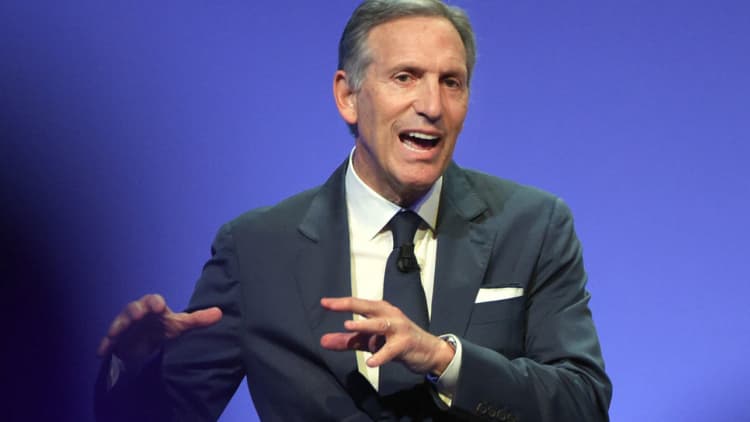
Self-described centrists are not happy with former Starbucks CEO Howard Schultz, who said over the weekend that he was seriously considering a bid for president as a "centrist independent, outside of the two-party system."
Schultz, a lifelong Democrat, said during an interview with CBS' "60 Minutes" that aired Sunday that he disagreed with both parties and would seek the votes of those who identify as neither Republicans nor Democrats.
But the leading center-left think tank in Washington is already blasting the move.
"If Schultz runs, let it be as a Democrat," Jim Kessler, co-founder of Third Way and its executive vice president for policy, said in an email.
"The number one danger in the world is not climate change or the national debt but Donald Trump winning a second term," Kessler said. "An independent run by Howard Schultz runs the risk of allowing an extremely unpopular president to squeak through a crowded field."
By announcing a potential challenge as an independent, Schultz found a rare spot of bipartisan agreement in American politics. Right, left and center immediately attacked Schultz's plan.
Larry Sabato, an elections expert and the director of the Center for Politics at the University of Virginia, said Schultz's interview revealed that "the man knows nothing about politics."
Schultz's comments immediately drew the fury of Democratic 2020 contenders and top strategists, as well as an angry tweet from President Donald Trump.
Julian Castro, a former Housing and Urban Development secretary under President Barack Obama, told CNN that a Schultz run "would provide Donald Trump with his best hope of getting re-elected." John Delaney, a former U.S. congressman from Maryland also vying for his party's nomination, said that if Schultz runs, "Trump wins."
Some Democrats even took their frustration with Schultz out on the corporation he ran for several years.
Neera Tanden, the head of the Center for American Progress and a former Hillary Clinton advisor, threatened to boycott Starbucks "because I'm not giving a penny that will end up in the election coffers of a guy who will help Trump win."
For his part, Trump also derided Schultz's statement, writing in a tweet that the coffee mogul "doesn't have the 'guts' to run for President!"
"Watched him on @ 60Minutes last night and I agree with him that he is not the 'smartest person,'" Trump wrote. "Besides, America already has that! I only hope that Starbucks is still paying me their rent in Trump Tower!"
'Slivers matter'
Howard Wolfson, a top political advisor to former New York Mayor Michael Bloomberg, who has been floated in the past as a possible independent presidential contender, said on Sunday that he believed a Schultz bid would be a boon to Trump.
"I have seen enough data over many years to know that anyone running for POTUS as an independent will split the anti-incumbent, anti-Trump vote," Wolfson wrote in a post on Twitter.
Bloomberg, in a statement, said on Monday that "the great likelihood is that an independent would just split the anti-Trump vote" and urged Democrats to "remain united."
Sabato said the 2000 and 2016 elections, which each featured a prominent Green Party nominee, showed how little it takes to influence the outcome of an election. Research in the years since 2000 has shown that Ralph Nader, who ran for the Green Party in 2000, was a decisive factor in the election of George W. Bush.
"Even a sliver of the vote in these hyper-partisan times, where we are going to have close elections frequently, they will determine who wins," said Sabato, who handicaps elections at his Crystal Ball website. "Slivers matter."
Even a sliver of the vote in these hyper-partisan times, where we are going to have close elections frequently, they will determine who wins.Larry Sabatoelections analyst
And he said that Schultz was off base when he claimed to "60 Minutes" that 40 percent of Americans are independents. Though approximately that percentage tell pollsters they identify as independents, Sabato pointed to a wide body of academic literature that reveals that nearly all self-identified independents vote for one party with the same consistency as fervent party loyalists.
"I personally think independents are under 10 percent. Others make the argument that it may be 12, 13, 14 percent. Okay. 40 percent? Get real," he said.
"To base a presidential campaign — when you declare you want to win — on this phony statistic, which he casually tossed out there, revealed to me how little he knows," Sabato said.
A party of one
Schultz has dismissed the concerns. Asked if he was concerned that his run would boost Trump's 2020 odds, Shultz told "60 Minutes" on Sunday that he wanted "to see America win."
"I don't care if you're a Democrat, independent, Libertarian, Republican. Bring me your ideas. And I will be an independent person who will embrace those ideas," he said. "Because I am not, in any way, in bed with a party."
During the interview, Schultz laid out an agenda that was largely in line with moderate Democrats. He said he supported a path to citizenship for undocumented immigrants, lower taxes for the middle class, and the universal right to quality health care. But he said that "free health care for all" is unrealistic.
Given those positions, Schultz might find a receptive audience among Democrats, Kessler suggested.
"The water is warmer in the party than he thinks," he said.


